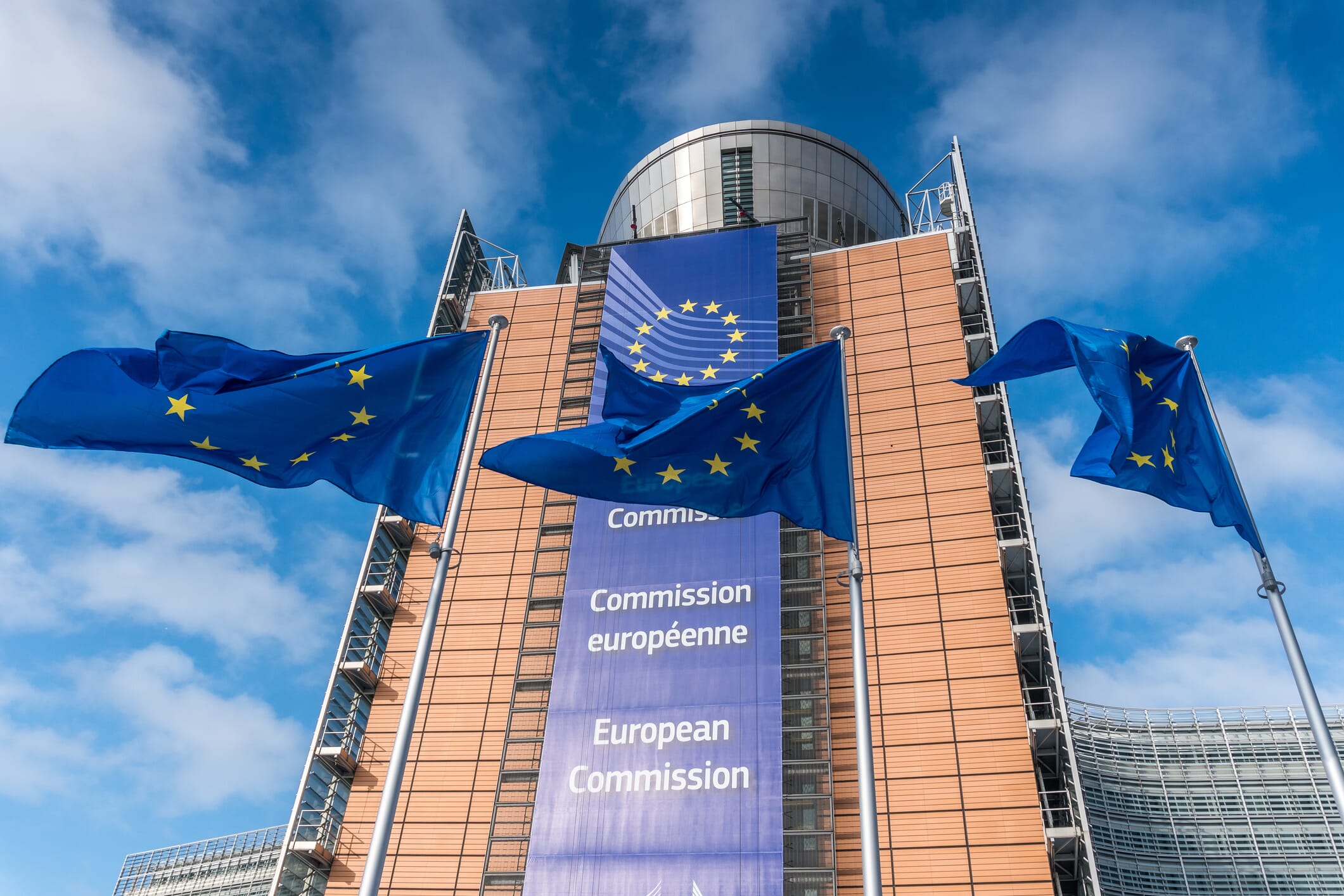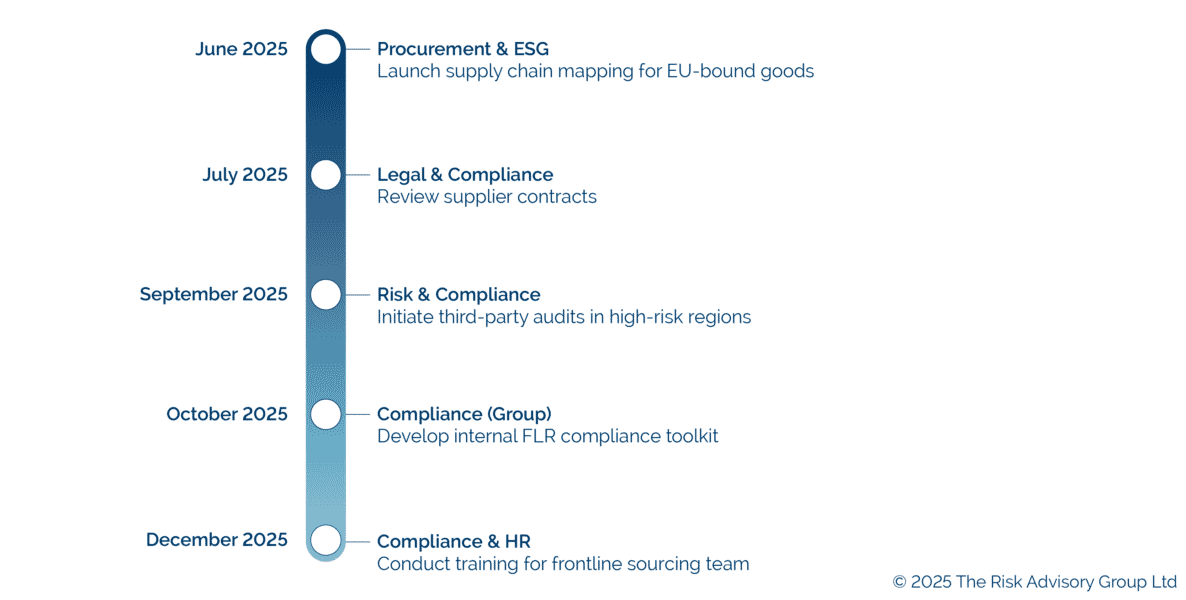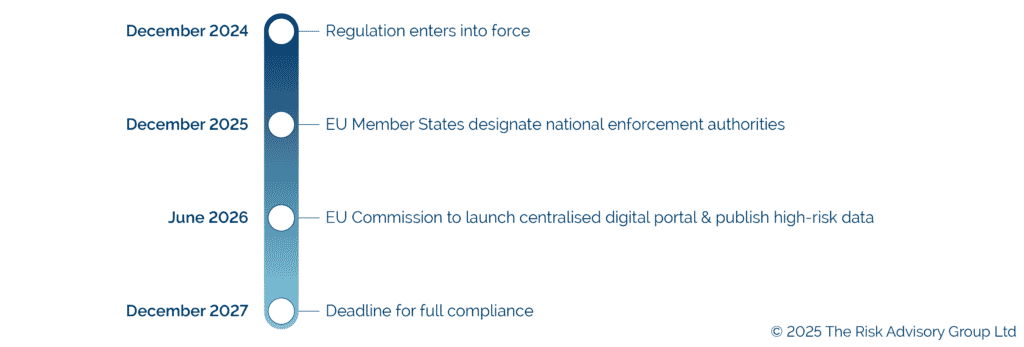
Less than a minute Read
EU Forced Labour Regulation: What global businesses need to know now
On 13 December 2024, the European Union’s Forced Labour Regulation (EU) 2024/3015 officially came into effect. As a historic legal instrument, the regulation significantly raises the bar on corporate responsibility, targeting the use of forced labour at any point in a product’s lifecycle—from raw materials to finished goods.
Unlike previous EU laws, this regulation imposes a comprehensive ban on the placing and exporting of products made with forced labour, regardless of company size, sector, or geographic origin. Businesses worldwide, particularly those operating in high-risk regions such as Southeast Asia, now face heightened exposure to regulatory enforcement and reputational risk.
With full compliance required by December 2027, companies must now assess and strengthen their due diligence measures as a matter of urgency. Here’s what you need to know—and what steps to take now.
A distinct legal framework
While the Corporate Sustainability Due Diligence Directive (CSDDD)—which came into force in July 2024—addresses human rights risks more broadly, including forced labour, the Forced Labour Regulation is narrower in scope and, crucially, applies to all products, irrespective of turnover or headcount thresholds.
It prohibits the sale (including online and through distance sales), distribution, or export of goods produced using forced labour at any stage of production. The definition aligns with the International Labour Organization’s Convention No. 29, which describes forced labour as “all work or service exacted under the menace of any penalty and for which the person has not offered themselves voluntarily.”
Enforcement mechanisms and timelines
Under the regulation, investigations will be led by designated national authorities in EU Member States or by the European Commission where forced labour is suspected outside the EU. These investigations will be evidence-driven, with companies required to provide detailed product and supply chain information via a centralised digital portal.
Any product found to be associated with forced labour may be withdrawn from the EU market, seized, or ordered for disposal. Companies that fail to cooperate or obstruct investigations may also face financial penalties and significant reputational damage.
Key dates include:
Overlapping but separate from the CSDDD
While the CSDDD and Forced Labour Regulation may overlap, they function independently. Notably, the CSDDD’s implementation timeline was extended following a European Parliament vote on 3 April 2025. The earliest group of large companies—those with over 5,000 employees and €1.5 billion turnover—now face a compliance deadline of July 2028, one year later than originally anticipated.
Unlike the CSDDD, the Forced Labour Regulation does not introduce new due diligence obligations, but it does strongly encourage companies to adopt established international frameworks, including the UN Guiding Principles on Business and Human Rights, OECD Guidelines, and ILO conventions.
ASEAN in focus: Supply chain risk and exposure
Although the regulation is geographically neutral, supply chains connected to ASEAN countries will likely receive particular scrutiny. Many multinational companies have shifted manufacturing to Southeast Asia under “China Plus One” strategies—yet the region continues to face systemic labour rights challenges.
A 2024 study by the Business & Human Rights Resource Centre (BHRRC) found that 37% of all reported cases of migrant worker abuse occurred in the Asia-Pacific region. Across ASEAN Member States, the risk of forced labour remains elevated in major export sectors including agriculture, construction, manufacturing, garments, and fishing.
High-risk countries include:
- Cambodia, Indonesia, Malaysia, Myanmar, Thailand, and Vietnam
- Common forced labour goods: rubber, palm oil, rice, coffee, cashews, garments, footwear, seafood
Real-world cases: Garments and seafood in the spotlight
In 2023, multiple global fashion brands announced plans to exit Myanmar due to a surge in labour rights violations following the 2021 military coup. A BHRRC investigation documented 212 abuse allegations linked to 124 factories and at least 46 brands, including wage theft, forced overtime, and harassment.
Thailand’s fishing industry has also been subject to international scrutiny. Despite regulatory improvements, reports as recent as 2024 still highlight debt bondage, physical abuse, and exploitative conditions aboard fishing vessels—risks that remain embedded in supply chains supplying European and North American markets.
Regional regulatory momentum
Some ASEAN nations are beginning to align more closely with international labour standards. Recent developments include:
- Malaysia: Introduced a National Action Plan on Forced Labour and ratified ILO Convention No. 29’s 2014 Protocol
- Thailand: Developed its second National Action Plan on Business and Human Rights, and is preparing a new due diligence law
- Vietnam: Ratified ILO Convention No. 105 and adopted a revised Trade Union Law (effective July 2025) allowing foreign workers to participate in unions
However, progress is uneven, and many sectors remain exposed due to weak enforcement, lack of transparency, or political instability.
What businesses should do now
With the regulation’s 2027 deadline fast approaching and enforcement mechanisms being established, companies must act now to avoid legal, financial, and reputational risks.

How Risk Advisory can help
At The Risk Advisory Group, we support clients in identifying and mitigating complex supply chain risks. Our tailored due diligence solutions help companies uncover and address exposure to forced labour, drawing on deep regional insight and regulatory expertise.
Whether you need to map your supply chain, strengthen compliance protocols, or respond to regulatory scrutiny, we can help you meet your legal and ethical obligations—while safeguarding your brand and operations.
Contact us to find out more about how we can support your business.
